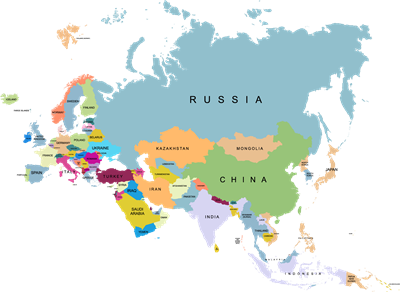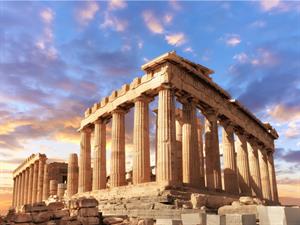PDF chapter test TRY NOW
Eurasia
The world was witnessing a dramatic change of events and wars during the ancient period. Change of powers, wars and conquests, and expansion of boundaries were part and parcel of people's daily lives.

Eurasia
This event brought numerous paradigm shifts in various geographical regions, say America, Africa, and other modern mighty places were not that significant during the early days. The civilisation was blooming in parts of Europe and Asian nations, which were called the Eurasian Highlands.
The Rise of new Civilisation on the shores of Greece and Rome paved the way for the development of human society, which Western countries later adopted.
The era of the intermingling of ancient Greek and Roman cultures are collectively called the Greco –Roman world.
Greco-roman world: This term refers to the people of countries sharing a common culture, language, traditions and geographical area, also known as people of the “Mediterranean world”.
The burgeoning of new religions and civilisations worldwide enabled trade and mingling of cultural practices, which enhanced the position of humans as individuals and the world as a whole.
The Hellenistic Greece:
When most parts of the world were still making baby steps into the realm of civilisations, people of the Mediterranean region, including Greece and Rome, were making further strides absent in most of the world.
Greece witnessed its civilisational high under the Hellenistic period, which lasted from \(750\) BC to \(338\) BC. Greece was under the stage of primitive development till the \(8^{th}\) century.
People of Sparta and Athens redefined the art of agriculture, especially Spartans followed a rigid military discipline which made them unique among the Hellenistic people.
The Emergence of City-states:
The developments of the Athens people enabled them to enhance the trade developments with other countries that could support the shores of Greece and Rome.

The Acropolis
People slowly started building settled houses and buildings to protect themselves from their adversaries. Thus emerged the concept of City-States. These City-States are unique features of the Athenian government.
Acropolis: This Greek term means the “High city or City on top of the hill". People who ruled Athens were fond of establishing such giant structures.
There were conflicts between the City-States, but they were amicably settled within the people with similar language and cultural traditions.
Slavery in Greece:
Slavery was highly prevalent in Greece during the ancient time, with people losing the war, destitute from other regions, and people belonging to the lower class being kept as slaves by the rulers who owned the lands of Greece.
